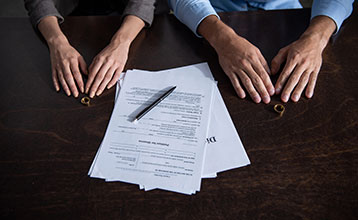From 1 July 2024, married couples can apply for divorce in Singapore by citing Divorce by Mutual Agreement (DMA).
The enactment of this law has been anticipated for over two years, as the Singaporean Parliament passed the initial law on 10 January 2022. It finally comes into law on 1 July 2024.
This landmark reform will depart from traditional fault-based divorce proceedings, allowing married couples to take a more collaborative and amicable approach to their separation.
A Summary of Divorce by Mutual Agreement (DMA)
To file for a Divorce by Mutual Agreement (DMA), the following conditions must be met:
- Duration of Marriage: The couple must be married for a minimum of three years.
- Written Agreement: Both parties must have a formal written agreement stating that their marriage has broken down irretrievably. This agreement must include:
- Reasons for Breakdown: A clear explanation of the reasons leading the parties to conclude that their marriage cannot be salvaged.
- Reconciliation Efforts: Documentation of the attempts made by both parties to reconcile and save the marriage.
- Future Arrangements: Considerations regarding financial arrangements and any plans for the care and welfare of any children from the marriage.
Understanding Divorce by Mutual Agreement
Divorce by Mutual Agreement provides couples an alternative route to ending their marriage without attributing blame. Couples may divorce based on any one of the following grounds:
- Divorce by Mutual Agreement (from 1 July 2024).
- Unreasonable behaviour.
- Desertion for at least two years.
- Three years separation with consent.
- Four years separation.
To obtain a Divorce by Mutual Agreement, married couples must mutually agree their marriage is over and beyond reconciliation. A separation period is not required before filing the divorce application.
Parties must still have been married for at least three years before filing for DMA, as stated under current law. They must also explain to the court in a written agreement why their marriage has broken down, how they have attempted reconciliation, and any arrangements they have made for their children and matrimonial finances.
Irretrievable breakdown under Divorce by Mutual Agreement
Spouses need to explain why their marriage has broken down irretrievably to give their DMA application the chance of succeeding. There could be many reasons why a couple has decided to separate formally, and the more detail provided in the application, the better.
DMA aims to reduce hostility and encourage cooperation between parties, so they don’t have to rely on fault-based reasoning to obtain a divorce. However, the fault-based facts may still be a reason stated within a DMA application to show the irretrievable breakdown of the relationship. The following are some examples of the reasons parties can state in their application to convince the court of their permanent separation:
- Arguments: Arguing is not uncommon in a marriage, but parties are likely to obtain a divorce if this is a persistent issue they can’t resolve, causing them emotional stress.
- Living separately: Some married couples drift apart and eventually decide to live separately. Under DMA, the court doesn’t require parties to have lived independently for a specific period before applying.
- Cultural differences: Different cultures or religions can cause severe difficulties in a marriage. Parties can reach a stalemate when they cannot agree on important issues due to their cultural or religious backgrounds.
- Lack of intimacy: Parties can rely on a lack of affection within the marriage to help support their application. The longer the parties have gone without intimacy, the more convincing their divorce application will be.
What are the statements required for Divorce by Mutual Agreement?
Attempts to reconcile
The written agreement also needs to address the parties’ efforts at reconciliation. If the court believes there is a possibility of the parties rebuilding their relationship, it can reject the divorce and direct the parties to mediate or attend counselling.
Some examples of how parties can demonstrate this are:
- Showing they have attended mediation or counselling already and it was unsuccessful.
- Disclosing any communications between spouses or their representatives showing attempts to reconcile.
- Explaining how trust has been broken repeatedly despite giving the relationship another chance.
- Providing examples of one party’s attempts to repair the relationship without reciprocation from the other party.
Again, the more detail the parties provide, the better chance they have of the application succeeding.
Arrangements for finances
Parties must explain to the court how they have considered dividing their finances following divorce. They do not need to agree on all financial matters before filing; the court simply wants an indication of their progress in settling this.
DMA hopes to encourage spouses to cooperate to reach financial agreements quicker than under the fault-based law. Parties should consider resolving these issues between them or via mediation in the first instance, and only referring finances to the court as a last resort.
If the parties reach a financial settlement before filing the divorce application, they should provide precise details. If not, they should identify any matters they have agreed on and the issues left to determine.
Arrangements for children
If the parties have children, they must inform the court of their discussions about care arrangements. Again, parties do not need to have everything resolved before applying for a divorce, but it is an issue parties must consider carefully.
The court expects parents to minimise the negative impacts of divorce on children by trying to agree on child arrangements without its intervention, as legal proceedings will often delay matters and increase animosity.
The parties should provide details of any informal care agreement in the divorce application. Any issues they cannot agree on, such as holidays abroad or schooling, should be flagged so the court knows where the parties stand.
Mandatory Co-Parenting Programme
Another law change from 1 July 2024 is the introduction of the Co-Parenting Programme (CPP) for parties applying for DMA under the simplified track. The simplified track is the fastest and easiest way to obtain a divorce and usually takes around four months.
Separating couples can access the simplified track if they agree to divorce and have resolved all other matters arising from their legal separation, including finances, child arrangements, and maintenance. Parties who apply for DMA through this route and have children are legally required to attend the CPP, even if they have agreed on arrangements.
The CPP aims to educate parties on the importance of co-parenting after separation. It involves e-learning materials and a session with a counsellor designed to guide separated couples through a new form of parenting.
Under the current law, parties who cannot agree on child arrangements (and therefore cannot apply under the simplified track) must also attend the programme before applying for divorce.
The rationale behind DMA
DMA reflects a shift towards recognising divorce as a complicated issue. In our modern society, people need autonomy in their relationships, and a more flexible framework for navigating a formal separation. The new law aims to reduce acrimony and facilitate a smoother process, benefiting families and courts alike.
There are concerns regarding DMA trivialising the institution of marriage and undermining it as a legal concept. However, requiring a written statement detailing the circumstances of the separation, and attempts to reconcile, arguably provides an adequate safeguard to uphold the sanctity of marriage. Whether the new law correctly strikes this delicate balance between autonomy and marital integrity is yet to be seen.
Benefits of Divorce by Mutual Agreement
The practical benefits of DMA will become apparent once the law comes into force, and couples start applying under this new ground. However, it’s expected it will be beneficial for the following reasons:
- Promoting amicable resolutions: DMA encourages cooperation and compromise, enabling couples to navigate divorce with greater understanding and respect. By eliminating the need to blame, DMA paves the way for smoother divorces and healthier post-divorce relationships.
- Empowering individuals: The current fault-based system often forces spouses to engage in acrimonious legal proceedings to prove their spouse’s wrongdoing. DMA will instead allow individuals to take control of their divorce proceedings. Couples can then focus on making decisions based on their needs rather than legal tactics.
- Streamlining proceedings: Fault-based divorce proceedings are notorious for their complexity and extended timelines. DMA simplifies the divorce process, particularly where the parties have agreed on all other related matters. It will allow the court to fast-track proceedings and for parties to save on legal fees.
- Protecting children’s interests: Divorce can profoundly impact children, often causing them emotional harm. DMA prioritises children’s best interests by fostering meaningful co-parenting relationships and reducing families’ time in court proceedings.
- Enhancing access to justice: DMA promotes fairer access to justice by providing couples with a more accessible and less adversarial route to divorce. It will likely be easier for parties in worse financial or social circumstances to access the divorce procedure under DMA and move forward with their lives.
- Reducing stigma: Traditional views on divorce often create stigma and shame, particularly in certain cultures, and such feelings are exacerbated by the need to blame. DMA offers parties a more dignified means of ending their marriage by avoiding the need to rehash their issues or focus on fault.
Conclusion
Divorce by Mutual Agreement under Section 95 of the Women’s Charter offers a dignified, efficient, and cost-effective path to ending a marriage. For those seeking to dissolve their marriage amicably, this ground provides the best option compared to more contentious and lengthy alternatives. By choosing a leading family law firm like PKWA Law, clients benefit from well-drafted statements that the court requires, expert guidance, emotional support, and a clear, transparent fee structure, ensuring a smooth transition to the next chapter of their lives.
Uncontested Divorce
$1,490
No children, property or maintenance
$2,490
With children, property and maintenance


